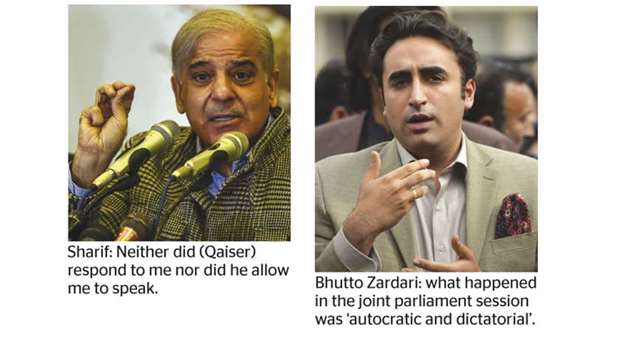Terming it a “black day” in the country’s parliamentary history, Leader of the Opposition in the National Assembly (NA) and Pakistan Muslim League – Nawaz (PML-N) president Shehbaz Sharif slammed NA Speaker Asad Qaiser for “trampling upon parliamentary norms and bulldozing legislation”.
Addressing a press conference along with Pakistan Peoples Party (PPP) chairman Bilawal Bhutto Zardari and other opposition leaders after a walkout from the joint sitting of parliament, Sharif said the legislation passed in haste granted the government unabated power to violate constitutional rights of people, particularly their political opponents, in the name of the Financial Action Task Force (FATF).
He said the speaker did not even allow debate and discussion on the first draft of the legislation, and backed out of his promise of allowing the opposition leader to speak at the joint session.
Sharif said that the speaker had “crossed a red line” and the opposition had been forced to deliberate on what course of action to take over such unacceptable conduct, which forced the opposition to boycott the joint session.
He said the opposition understood the crucial nature of this legislation more than the government, and had come up with the most ethical and comprehensive amendments in true spirit of nationalism and patriotism, not for any personal benefit.
Sharif rejected the allegation that the opposition was asking for NRO (national reconciliation ordinance: a form of general amnesty) as a bargain to help pass FATF-related legislation.
He said that the leaders of the PPP and PML-N having already braved imprisonment over “fake” cases, and still in National Accountability Bureau (NAB) custody, “why would they want an NRO now”.
“Genuine amendments” to the bills were not entertained, Sharif said, adding that he would register a strong protest against the speaker of the National Assembly for not letting him speak.
He said he even went to the rostrum and requested that Qaiser let him speak.
“Neither did he respond to me nor did he allow me to speak, which I think is an unparliamentary attitude,” he said.
Zardari said that what happened in the joint session was “autocratic and dictatorial”.
He said that the PPP and the opposition could not let such dangerous precedents be set in parliamentary democracy in Pakistan, and strong action would be taken against it in the multi-party conference (MPC).
He urged the people to support the MPC and answer its call because it is their last hope against “total dictatorship of the Pakistan Tehreek-e-Insaf regime”.
Zardari said that the opposition leaders are already facing “supra-constitutional and illegal abductions and imprisonment” under the government’s “political victimisation”, and that they are the ones to be least-affected by the newly-enacted law.
He said that it is the businessmen and ordinary citizens who would be worst affected by this legislation, which usurped constitutional rights by mandating arrest without warrant, with no right to bail, and unquestioned detention.
The PPP chairman said that Speaker Qaiser not only violated all rules and norms, but also rejected the call for recount of votes, which showed that the treasury benches did not have the required numbers.
He said that the opposition suspected that the speaker counted the government advisers as well, which was why the matter would be deliberated upon in the MPC and challenged at an appropriate forum.
“It is not the speaker’s right to stop the leader of the opposition from speaking in the parliament,” he said. “The leader of the opposition or the leader of the house can speak whenever they want to.”
The PPP chief added that senior opposition leaders, who had also been members of the parliaments during the Musharraf and Zia eras, said that they had never seen such non-democratic practices taking place in the past.
“After the Islamabad High Court’s decision, legislation cannot be presented by an adviser,” he said, regretting that the speaker was not “ready to listen to this argument”.
Referring to the government’s amendments to the Anti-Money Laundering Bill, the PPP chairman said that now police did not need a warrant to arrest anyone.
He said the opposition is already bearing the brunt of the NAB’s “coercive” tactics, adding that these new amendments would have an adverse impact on the country’s business community and as a result, on the economy.

..
